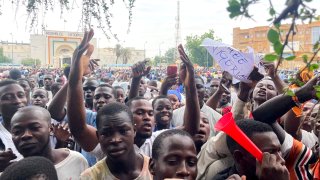
Niger's president defiantly declared Thursday that democracy would prevail, a day after mutinous soldiers detained him and announced they had seized power in a coup over the West African country’s deteriorating security situation.
While many people in the capital of Niamey went about their usual business, it remained unclear who was in control of the country and which side the majority might support. A statement tweeted by the army command’s account declared that it would back the coup in order to avoid a “murderous confrontation” that could lead to a “bloodbath.” It was not possible to confirm that the statement was genuine.
Meanwhile, President Mohamed Bazoum — who was elected in 2021 in Niger’s first peaceful, democratic transfer of power since its independence from France and is a key ally of the West — appeared to have the backing of several political parties.
“The hard-won achievements will be safeguarded. All Nigerians who love democracy and freedom will see to it,” Bazoum tweeted early Thursday morning.
Get a weekly recap of the latest San Francisco Bay Area housing news. Sign up for NBC Bay Area’s Housing Deconstructed newsletter.
Foreign Minister Hassoumi Massoudou issued a similar call on news network France 24, asking “all Nigerien democratic patriots to stand up as one to say no to this factious action.”
He demanded the president's unconditional release and said talks were ongoing. Benin President Patrice Talon, head of the Economic Community of West African States, is expected to lead mediation efforts.
Bazoum is a key ally in the West's efforts to battle jihadists linked to al-Qaida and the Islamic State group in Africa's Sahel region. Extremists in Niger have carried out attacks on civilians and military personnel, but the overall security situation is not as dire as in neighboring nations.
U.S. & World
The fight against extremism in the region has become a major arena in which the West and Russia have vied for influence.
Bazoum was seen by many as the West's last hope for partnership in the Sahel after Mali turned away from former colonial power France and instead sought support from the Russian mercenary group Wagner. Wagner appears to be making inroads in Burkina Faso as well.
Western countries have poured aid into Niger, and U.S. Secretary of State Antony Blinken visited in March, seeking to strengthen ties. American, French and Italian troops are currently stationed in the country to train its soldiers, while France also conducts joint operations.
But the threat to Bazoum has raised concerns that Niger could also turn away from the West.
On Thursday, several hundred people gathered in the capital and chanted support for Wagner while waving Russian flags. Later, they began throwing rocks at a passing politician's car.
A day earlier, protesters had voiced support for Bazoum.
Underscoring the importance of Niger to the West, Blinken said Thursday that he had spoken with the president, saying that he “made clear that we strongly support him as the democratically elected president of the country.”
Blinken, who was in New Zealand, repeated the U.S. condemnation of the mutiny and said his team was in close contact with officials in France and Africa.
On Wednesday morning, members of the presidential guard surrounded Bazoum's house and detained him.
The mutinous soldiers, who call themselves the National Council for the Safeguarding of the Country, took to state television and announced they had seized control because of deteriorating security and poor economic and social governance in the nation of 25 million people. They said they had dissolved the constitution, suspended all institutions, and closed all the borders.
The attempted coup was reportedly led by the head of the presidential guard, General Tchiani, who the president had planned to relieve from his position, Niger analysts say.
According to someone close to the president who spoke on condition of anonymity because they were not authorized to speak about the situation, the president has not and will not resign and is safe in his residence.
In a statement Wednesday, several political parties expressed their support for him, calling the coup attempt “suicidal and anti-republican madness.”
The “country, faced with insecurity, terrorism and the challenges of underdevelopment, cannot afford to be distracted,” they said.
In an interview with the Associated Press in December, Bazoum said that while there's always the possibility of a coup in the face of the extremist threat, Niger had the situation under control. "We are doing well in managing our own situation,” he said.
The international community strongly condemned the attempted takeover.
French Foreign Minister Catherine Colonna tweeted that France is concerned about the events in Niger and following the situation closely. France “firmly condemns any attempt to take power by force,” the minister said.
U.N. Human Rights chief Volker Türk called for Bazoum's release and said “all efforts must be undertaken to restore constitutional order and the rule of law.”
Russia also called for the president's release and Foreign Ministry spokeswoman Maria Zakharova said the country wants to see “a speedy resolution of this internal political crisis.”
___
Associated Press reporters Tracy Brown in Washington and John Leicester in Paris contributed.



